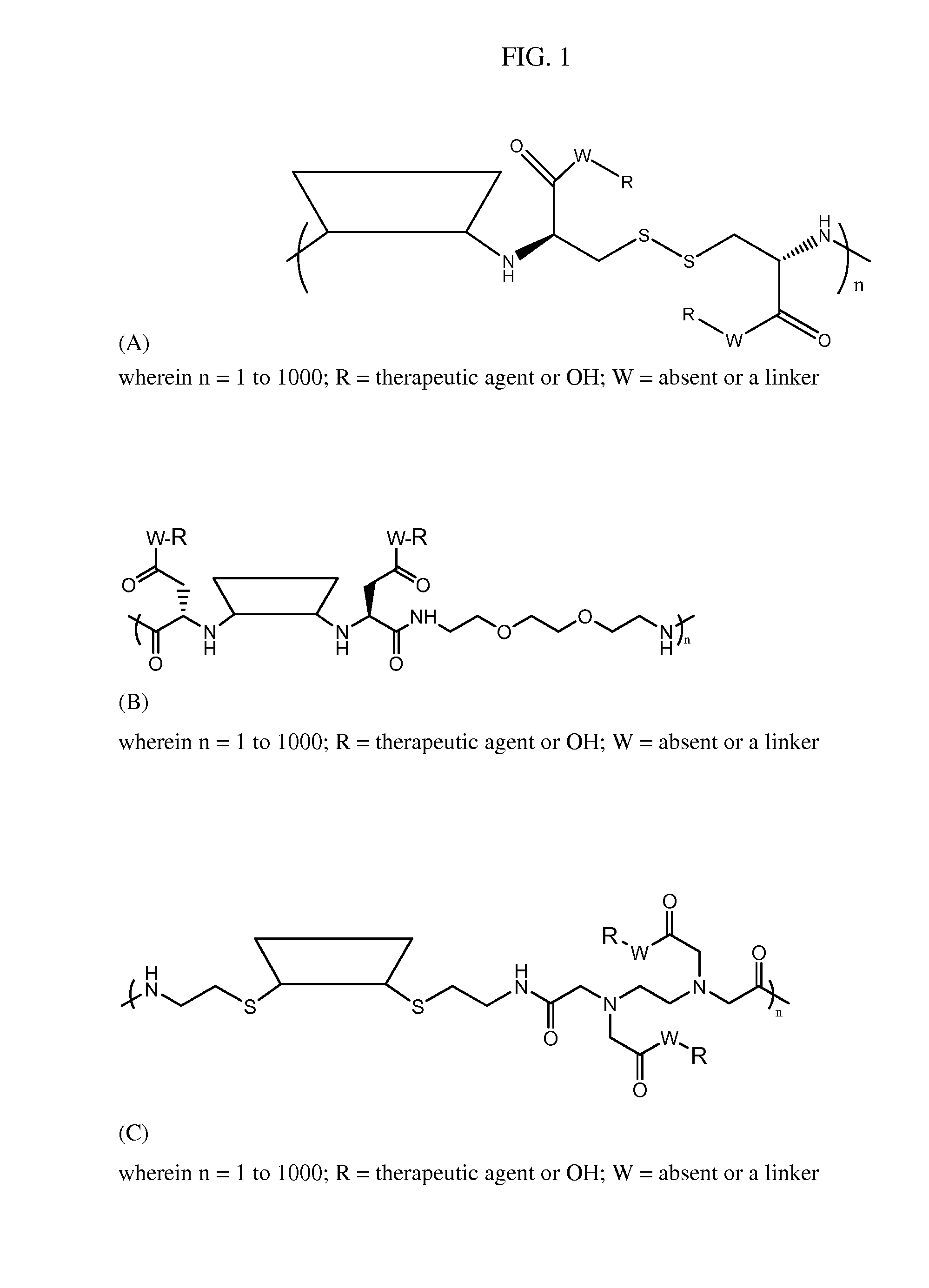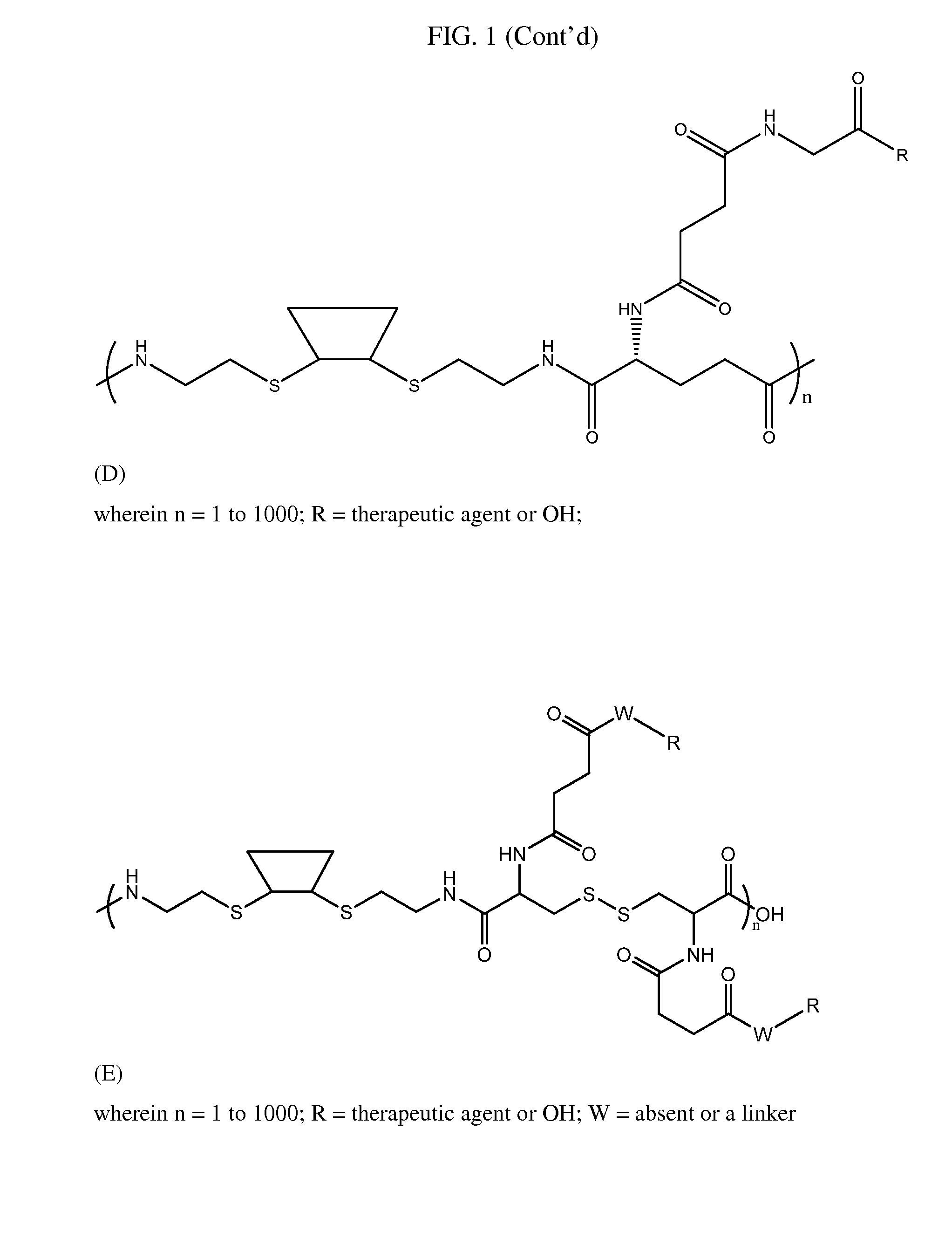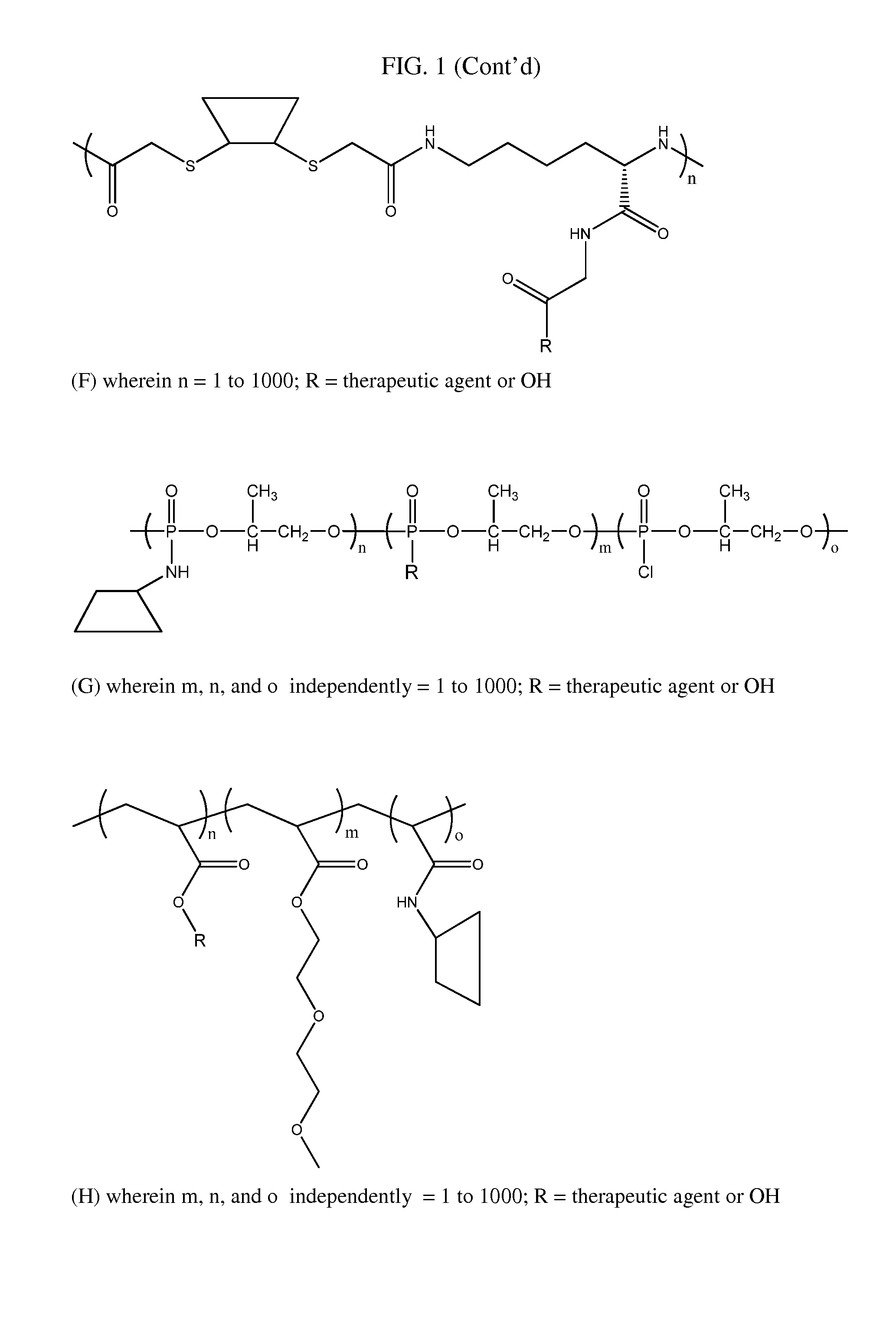Cyclodextrin-based polymers for therapeutic delivery
- Summary
- Abstract
- Description
- Claims
- Application Information
AI Technical Summary
Benefits of technology
Problems solved by technology
Method used
Image
Examples
example 1
Synthesis of 6A,6D-Bis-(2-amino-2-carboxylethylthio)-6A,6D-dideoxy-β-cyclodextrin, 4 (CD-BisCys)
[1414]
[1415]167 mL of 0.1 M sodium carbonate buffer were degassed for 45 minutes in a 500 mL 2-neck round bottom flask equipped with a magnetic stir bar, a condenser and septum. To this solution were added 1.96 g (16.2 mmol) of L-cysteine and 10.0 g (73.8 mmol) of diiodo, deoxy-β-cyclodextrin 2. The resulting suspension was heated at a reflux temperature for 4.5 h until the solution turned clear (colorless). The solution was then cooled to room temperature and acidified to pH 3 using 1N HCl. The product was precipitated by slow addition of acetone (3 times weight ratio of the solution). This afforded 9.0 g crude material containing CD-biscysteine (90.0%), unreacted cyclodextrin, CD-mono-cysteine and cystine. The resulting solid was subjected to anionic exchange column chromatography (SuperQ650M, Tosoh Bioscience) using a gradient elution of 0-0.4M ammonium bicarbonate. All fractions were ...
example 2
Synthesis of Gly-CPT (Structure 11) (Greenwald et al., Biorg. Med. Chem., 1998, 6, 551-562)
[1416]
[1417]t-Boc-glycine (0.9 g, 4.7 mmol) was dissolved in 350 mL of anhydrous methylene chloride at room temperature, and to this solution were added DIPC (0.75 mL, 4.7 mmol), DMAP (382 mg, 3.13 mmol) and camptothecin (0.55 g, 1.57 mmol) at 0° C. The reaction mixture was allowed to warm to room temperature and left for 16 h. The solution was washed with 0.1 N HCl, dried and evaporated under reduced pressure to yield a white solid, which was recrystallized from methanol to give camptothecin-20-ester of t-Boc-glycine: 1H NMR (DMSO-d6) 7.5-8.8 (m), 7.3 (s), 5.5 (s), 5.3 (s), 4 (m), 2.1 (m), 1.6 (s), 1.3 (d), 0.9 (t). Camptothecin-20-ester of t-Boc-glycine (0.595 g, 1.06 mmol) was dissolved in a mixture of methylene chloride (7.5 mL) and TFA (7.5 mL) and stirred at room temperature for 1 h. Solvent was removed and the residue was recrystallized from methylene chloride and ether to give 0.45 g o...
example 7
Synthesis of Various CDP-Etoposide Conjugates
[1446]In Table 5, various linkers that can be used to link an etoposide to CDP as well as the proposed mechanism of release are listed.
TABLE 5Various linkers that can be used to link an etoposide to CDPRelease#StructureCodemechanism 1 (1)Gly esterEnzyme, Base 2 (2)GlyGly esterEnzyme, Base 3 (3)GlyGlyGly esterEnzyme, Base 4GFLG- Gly- esterEnzyme (Cathepsin)- base 5 (5)Mini-PEG esterEnzyme, Base 6 (6)Phospho- esterEnzyme, Base 7GFLG Phospho- esterEnzyme (Cathepsin), base 8GFLG- dmeda- carbamateEnzyme 9Cis- aconityl- meda- carbamateAcid10Disulfide- dmeda- carbamateOxido- reductive with remote release (1,6 elimination followed by cyclization)11Phosphoro- amide (FY23)Base, Enzyme (posphatase)12 PhosphoroesterPhosphoro- esterEnzyme, Base13Disulfide- carbonateOxido- reductive with remote release (cyclization)14Disulfide- carbamateOxido- reductive with remote release (cyclization)15 (2)GFLG- meda- carbamate (FY24)Enzyme (Cat...
PUM
| Property | Measurement | Unit |
|---|---|---|
| Disorder | aaaaa | aaaaa |
Abstract
Description
Claims
Application Information
 Login to View More
Login to View More - R&D
- Intellectual Property
- Life Sciences
- Materials
- Tech Scout
- Unparalleled Data Quality
- Higher Quality Content
- 60% Fewer Hallucinations
Browse by: Latest US Patents, China's latest patents, Technical Efficacy Thesaurus, Application Domain, Technology Topic, Popular Technical Reports.
© 2025 PatSnap. All rights reserved.Legal|Privacy policy|Modern Slavery Act Transparency Statement|Sitemap|About US| Contact US: help@patsnap.com



